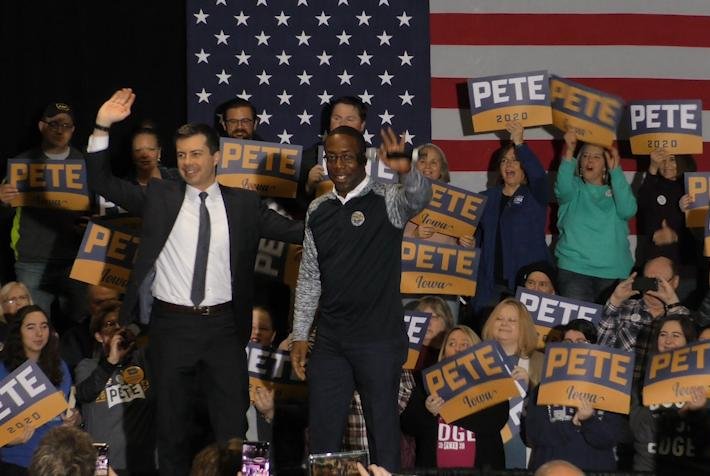1 of 5 | Presidential candidate Pete Buttigieg campaigns with Mayor Quentin Hart in Waterloo, Iowa on Saturday. Photo by Sam Cabral/Medill News Service
WATERLOO, Iowa, Feb. 7 (UPI) -- Before the results of the Iowa caucuses trickled in, one of the main concerns for the campaign of former South Bend, Ind., Mayor Pete Buttigieg was his lack of support from minority voters.
Buttigieg hoped to repair that with the support of Waterloo's African-American mayor, Quentin Hart.
However, as Buttigieg hopes to carry momentum from Iowa to New Hampshire, his support from minority voters remains low, indicated by his lackluster performance in Waterloo, the most ethnically diverse city in Iowa.
Buttigieg finished a distant second in Waterloo to Vermont Sen. Bernie Sanders in all three sets of results released by the Iowa Democratic Party. He also failed to reach the 15 percent viability threshold in 10 out of 30 caucus locations around the city, including all six precincts of Ward 4, home to the most diverse and least affluent neighborhoods.
On Saturday, 48 hours before the caucus, Buttigieg expressed confidence he could win in places like Waterloo.
"It's a city that reminds me a lot of home," he said after a town hall in which he made his final pitch to about 500 voters in a packed ballroom.
"I'm from a racially diverse, industrial, river city here in the Midwest," Buttigieg said. "It lines up with the story of my own community and is part of what I envision as the future of the middle of the country -- being diverse, forward-looking and empowered."
Waterloo is not much different from South Bend, the city that Buttigieg says he has helped turn around. Waterloo is a city of 70,000 that resides on the Cedar River, while South Bend has a population of 100,000 living on the banks of the St. Joseph River. Much like South Bend, Waterloo is home to a large African-American population, about 16 percent of residents, as well as Hispanic, Bosnian and Congolese immigrants.
It has also endured many years of high unemployment and poverty rates, after large manufacturers like John Deere left the city in droves in the 1980s.
"There were a lot of thriving businesses. We were considered Factory City," said Hart, who recently endorsed Buttigieg and appeared with him at the Saturday town hall.
Hart is Waterloo's first African-American mayor and only the third in the history of the state. He has expressed strong support for the Douglass Plan for black Americans, a series of economic policy proposals by the Buttigieg campaign. He believes Buttigieg is committed to empowering minority Americans and has been evaluated unfairly compared with other candidates.
"I urgently believe that if we're going to give a litmus test on a particular area for one candidate, then we need to ask every candidate some of those same questions, so we can hear what they're going to do. What's your vision for black America?" said Hart.
"The real story is he inherited a community that had challenges prior to him getting there, just like I did. Mayors can't run from those problems. We have to run to them, and that's what I've seen him doing while he was there."
Buttigieg often touts the "turnaround" of South Bend under his leadership as a strong indicator of his executive-level experience. But the resume proved insufficient on Monday, particularly in Ward 4, where he received no delegates at all.
"This is the diverse coalition of my neighbors who came out in Waterloo Ward 4 Precinct 5 to support Bernie Sanders," tweeted Chris Schwartz, a Black Hawk County supervisor and a state co-chairman for the Sanders campaign, attaching a photo of Sanders supporters.
In a sign of his steady support from minority voters, former Vice President Joe Biden won four out of the six precincts in Ward 4, with Sanders winning the other two. Massachusetts Sen. Elizabeth Warren and entrepreneur Andrew Yang also passed the viability threshold in at least one precinct in Ward 4.
Waterloo has consistently voted in favor of the Democratic Party in general elections. But the city has an added distinction: Its caucus results have predicted the eventual Democratic nominee in the past five election cycles. In 2016, Hillary Clinton picked up Waterloo on her way to the nomination, even though she lost the county to Sanders.
2020 Democratic presidential candidates, from left to right, Tom Steyer, Sen. Elizabeth Warren, former Vice President Joe Biden, Sen. Bernie Sanders, former Mayor Pete Buttigieg and Sen. Amy Klobuchar gather
onstage for a debate in Des Moines, Iowa, on January 14. Photo by Mike Theiler/UPI |
License Photo
















